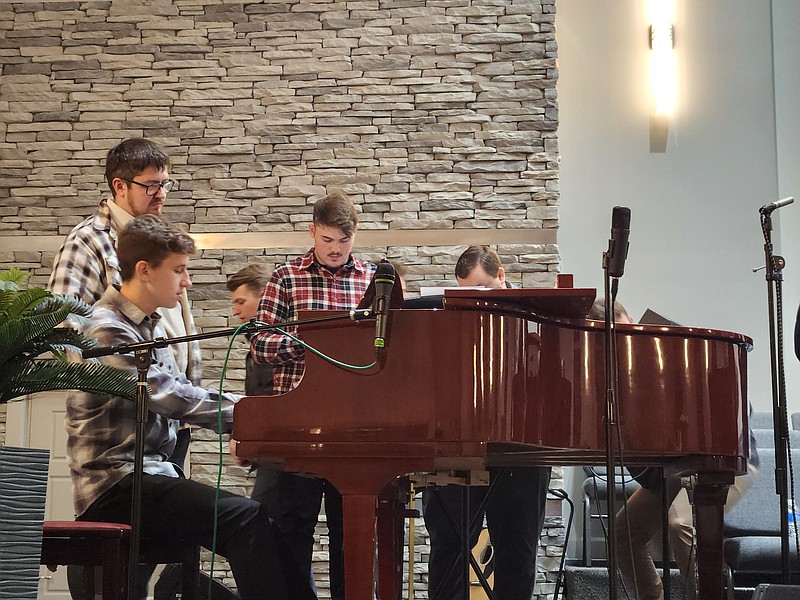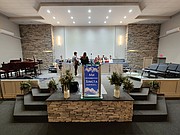Stanislav Vadrus was studying violin in Ukraine when war broke out in the country's Donbas region, preventing him from going home to his family.
Natalia Korchakovska was in Odessa studying to become a dentist when Russia attacked Ukraine earlier this year.
Saturday night, both were far from home as they went with Chattanooga's Ukrainian Gospel Church youth choir to the doorsteps of its congregants, singing many of the same Christmas carols they knew growing up.
They are but two among several million Ukrainian refugees of war, forced to leave behind loved ones, friends and a home that may never be the same. Now in a foreign land, Vadrus and Korchakovska seek meaning and security in music -- and God.
Where refugees end up can reflect their own unique webs of connection. Vadrus came to Chattanooga with his brother's family, facilitated by a link to Eddie Sidlinskiy, the youth pastor at the Ukrainian Gospel Church. Korchakovska, who came with her siblings and parents, had relatives in the congregation.
The final rehearsal before the Christmas Eve caroling outing was Thursday evening. Korchakovska sang in the choir at the church on Bonny Oaks Drive, along with her sister and their cousin, as well as Vadrus and about a dozen more young church members.
The choir director asked the group what they felt needed work. One girl mentioned a song with a Ukrainian name.
"I feel like every year we mess that up," she said.
At the end of the practice, Vadrus sang in a brief sectional practice with the other boys.
This is not his first Christmas away from home. He grew up in the mainly Russian-speaking Ukrainian province of Luhansk, he said through a translator at the church after the rehearsal. He was about three years into his music studies, envisioning becoming a teacher, when the war there broke out in 2014.
He finished his studies but said the unrest meant he could not travel through Luhansk to be with his parents and some of his younger brothers. Instead he joined a brother in Kyiv, and they sang with an informal group with a church there for several years before they moved to Gdańsk, Poland.
There, he and his brother continued to develop their sound. They started releasing music videos on a YouTube channel. They named it "Call of Salvation."
THE ATTACK
It was a Thursday in February, Korchakovska recounted with occasional translation help from her cousin.
She was sleeping in her room and awoke at 5 a.m. Panicked messages filled her phone. Ukraine was under attack.
She prayed, then tried to go back to sleep, she said. She heard girls crying in the hall on their phones with their families.
"I'm like, 'I'm not scared, because I trust God,'" she said. But then she thought, "I need to call my pop."
She awoke her dad. She said he told her "I'll check the news and then I will let you know what you must do" -- then immediately called back to insist she stay in her room as he came for her.
Terrible traffic slowed the drive back to Rozkvit, her hometown. At one point, they were just a few miles from an airport, Korchakovska said. They saw a bomb go toward it.
"Everything blew up," she said.
They made it home to her siblings and mom. Shops were emptied out, Korchakovska said. Frequent phone alerts urged her family to bomb shelters, where they sat on the floor.
At night, all lights were out and curfews were in effect, upheld by guards on the streets, Korchakovska said.
One time bomb alerts went off while she was in the shower, Korchakovska said, giggling with her sister and cousin at the memory. Her mom called out to her and she got frazzled, she remembered.
"I bring towel and go," she said.
Two months went by. The nearby city of Mykolaiv was attacked and occupied by Russian forces, she said, and some wondered if those forces would continue into Rozkvit.
An opportunity emerged for her family to move to the U.S. with their relatives in Chattanooga. Korchakovska said her family moved for about a month into a hotel designated for refugees in Lviv and then moved to another hotel in Poland where they -- Pentecostal Christians -- were helped by local religious groups.
The oldest of five children, Korchakovska said she did not want to leave. She felt her country needed her. "I can help people," she thought.
"But my parents said, 'you're my child.' You're all my children. So we have responsibility for you,'" and they all boarded planes for America.
"JOY TO THE WORLD"
Around that time, the atmosphere in Poland was getting uneasy, Vadrus said, and he and his brother's family decided they should take a rare opportunity to come to the U.S.
Since arriving, he's focused on music and the Call of Salvation YouTube channel, where some videos have amassed tens of thousands of views. He and his brother just re-posted an old rendition of "Joy to the World."
The song for one music video, filmed around Cleveland, Tennessee, is about Jesus' sacrifice and was written long ago by people who were in prison, he said.
The brothers send money home. Their father is sick, and treatments are expensive, Vadrus said. Some of his brothers are still in school. They were short last time he saw them. Now they look like grown men, he said. While their relationship is good, he fears his inability to see them every day has made them "strangers to one another."
"PRAISE GOD"
Chattanooga is not the New York-like metropolis Korchakovska imagined. In fact Chattanooga is kind of like Ukraine, she said.
"But a little different."
For example, the melodies of the church choir, while familiar, aren't quite the same.
"We say 'mmHmm.' They say 'Hmmhmm,'" she said, inflecting her hum up then down to mark the contrast.
Her sister goes to East Hamilton High School. Their parents wanted Natalia Korchakovska to go to school, too, but were told she is too old, she said. Now she is teaching Ukrainian to Americanized children of Ukrainian immigrants and takes English classes at Chattanooga State Community College twice a week, she said.
She knew a lot of words from English classes in Ukraine, she said. But now the flow comes easier. People who think she can't understand them are often mistaken, she said.
As recently as Thursday she had talked with her friends from Rozkvit. A lot of them have no electricity. Now it's winter -- and they wear warm clothes, she said.
The Russians eventually retreated a bit, she has heard, and her town was not attacked. But the threat remains, she said.
"If they can go, we will be next," she said.
Many of her friends are volunteering in areas that were formerly Russian-occupied, and she said they don't give up or doubt things will improve.
"Praise God," Korchakovska said. "They are all safe for now."
Contact Andrew Schwartz at aschwartz@timesfreepress.com or 423-757-6431.

